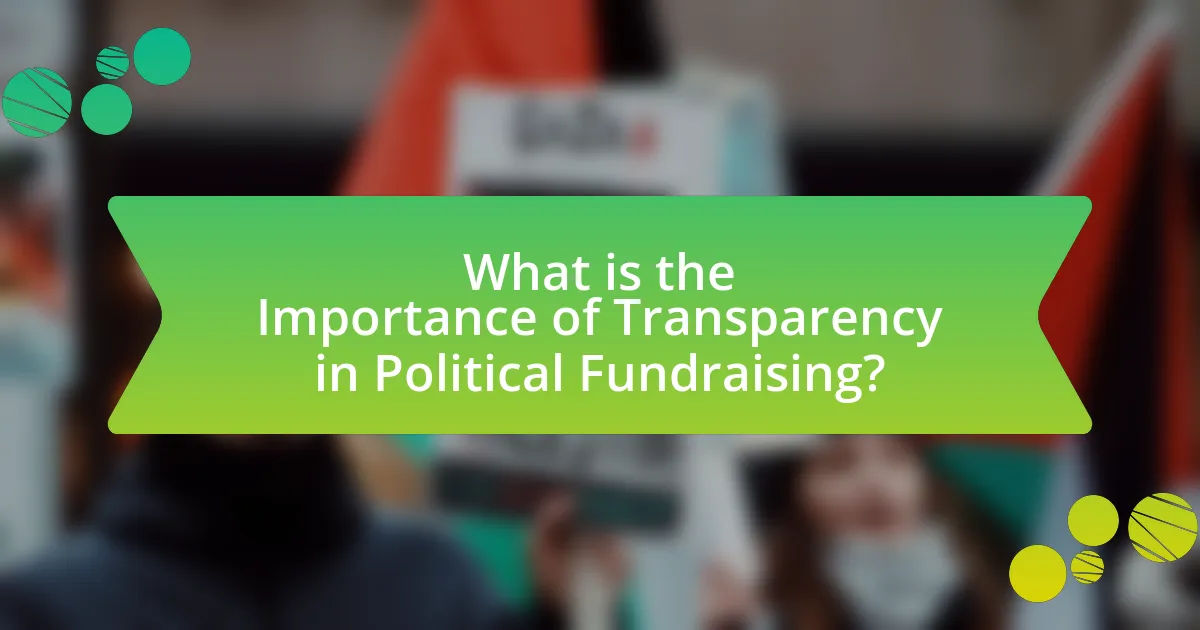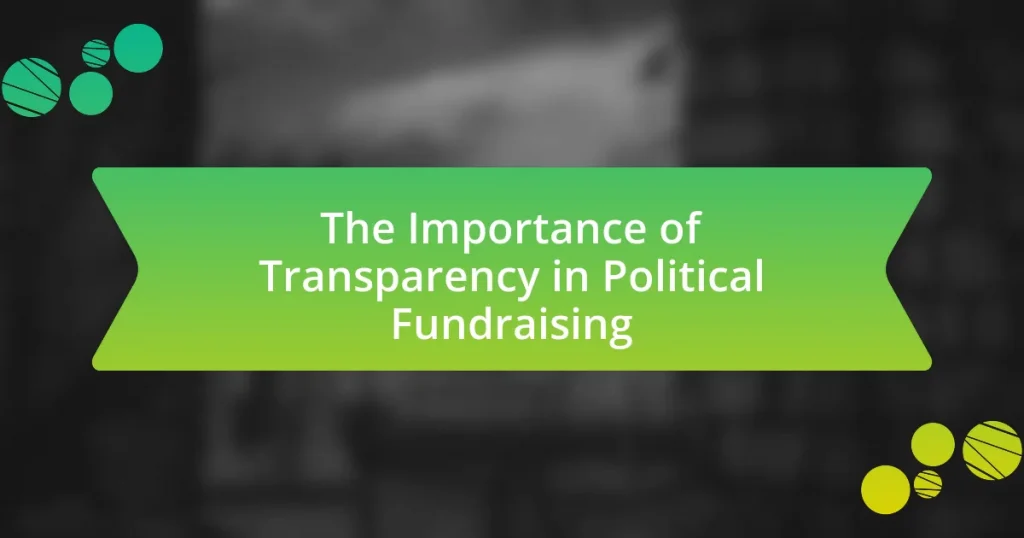The article focuses on the importance of transparency in political fundraising, emphasizing its role in fostering trust between candidates and voters. It outlines how transparency promotes accountability, reduces corruption, and enhances public confidence in the electoral process. Key findings from research, including studies by the Brennan Center for Justice, highlight that voters are more likely to support candidates who openly disclose their funding sources. The article also discusses the mechanisms that ensure transparency, the challenges faced in achieving it, and the implications for campaign finance laws, ultimately underscoring the benefits of transparency for a healthy democracy.

What is the Importance of Transparency in Political Fundraising?
Transparency in political fundraising is crucial as it fosters trust between candidates and voters. When donors and funding sources are disclosed, it allows the public to scrutinize potential influences on political decisions, thereby promoting accountability. Research from the Brennan Center for Justice indicates that transparency can reduce corruption and enhance public confidence in the electoral process. Furthermore, studies show that voters are more likely to support candidates who demonstrate openness about their funding sources, reinforcing the idea that transparency is essential for a healthy democracy.
Why is transparency crucial in political fundraising?
Transparency is crucial in political fundraising because it fosters trust between candidates and voters. When donors and the public can see where funds are coming from and how they are being used, it reduces the risk of corruption and increases accountability. For instance, research by the Brennan Center for Justice indicates that transparency in campaign finance can lead to greater public confidence in the electoral process, as voters are more likely to support candidates who are open about their funding sources. This transparency helps ensure that political influence is not disproportionately held by wealthy donors, thereby promoting a more equitable democratic process.
What are the potential consequences of a lack of transparency?
A lack of transparency in political fundraising can lead to significant consequences, including diminished public trust, increased corruption, and the potential for illegal activities. When voters perceive that financial contributions are hidden or undisclosed, they may lose faith in the electoral process, believing that decisions are influenced by undisclosed interests rather than the public good. Research by the Brennan Center for Justice indicates that transparency in campaign financing is crucial for maintaining democratic integrity, as it helps to deter corruption and ensures accountability. Furthermore, without clear disclosure of funding sources, there is a heightened risk of illegal contributions, which can undermine the legitimacy of political campaigns and erode the foundation of democratic governance.
How does transparency influence public trust in political candidates?
Transparency significantly enhances public trust in political candidates by providing clear and accessible information about their actions, decisions, and funding sources. When candidates openly disclose their financial backers and campaign expenditures, it reduces the perception of corruption and fosters accountability. Research from the Pew Research Center indicates that 70% of voters believe that transparency in campaign financing is crucial for trust in candidates. This level of openness allows voters to make informed decisions, as they can assess the potential influences on a candidate’s policies and priorities. Consequently, candidates who prioritize transparency are more likely to gain the confidence of the electorate, leading to increased support and engagement.
What role does transparency play in the democratic process?
Transparency is essential in the democratic process as it fosters accountability and trust between the government and its citizens. When political actions, decisions, and funding sources are openly disclosed, voters can make informed choices and hold elected officials accountable for their actions. For instance, research by the Brennan Center for Justice indicates that transparency in campaign financing leads to increased public trust in electoral processes, as citizens are more likely to support candidates whose funding sources are clear and ethical. This transparency helps to mitigate corruption and ensures that political power is not unduly influenced by undisclosed interests, thereby strengthening the overall integrity of democracy.
How does transparency affect voter engagement and participation?
Transparency significantly enhances voter engagement and participation by fostering trust in the electoral process. When voters perceive that political fundraising and campaign activities are conducted openly, they are more likely to feel informed and empowered to participate in elections. Research indicates that transparency in political financing can lead to increased voter turnout; for instance, a study by the Brennan Center for Justice found that states with stronger transparency laws experienced higher voter participation rates. This correlation suggests that when voters have access to information about campaign funding sources and expenditures, they are more inclined to engage with candidates and the electoral process, ultimately leading to a more active and informed electorate.
What are the implications of transparency for campaign finance laws?
Transparency in campaign finance laws enhances accountability and public trust in the electoral process. By requiring detailed disclosure of contributions and expenditures, transparency allows voters to understand the financial influences behind candidates and political parties. For instance, the Federal Election Commission mandates that candidates report contributions exceeding $200, which helps to identify potential conflicts of interest and undue influence from wealthy donors. This level of scrutiny can deter corruption and promote fair competition among candidates, as evidenced by studies showing that increased transparency correlates with lower levels of perceived corruption in political systems.

How does Transparency in Political Fundraising Work?
Transparency in political fundraising works by requiring candidates and political organizations to disclose their financial contributions and expenditures to the public. This process is governed by laws such as the Federal Election Campaign Act in the United States, which mandates regular reporting of donations above a certain threshold and the identification of donors. These disclosures enable voters to understand who is funding political campaigns, thereby promoting accountability and reducing the potential for corruption. For instance, the Federal Election Commission reported that in the 2020 election cycle, over $14 billion was raised for federal elections, with detailed records available for public scrutiny, illustrating the scale and transparency of political fundraising activities.
What mechanisms ensure transparency in political fundraising?
Mechanisms that ensure transparency in political fundraising include mandatory disclosure laws, public reporting requirements, and independent oversight bodies. Mandatory disclosure laws require candidates and political organizations to report contributions and expenditures, providing the public with access to this information. Public reporting requirements, often enforced by electoral commissions, mandate regular updates on fundraising activities, ensuring that financial data is current and accessible. Independent oversight bodies, such as the Federal Election Commission in the United States, monitor compliance with these laws and investigate potential violations, thereby reinforcing accountability in the fundraising process. These mechanisms collectively promote transparency and help prevent corruption in political financing.
What are the reporting requirements for political donations?
Political donations must be reported to ensure transparency and accountability in the electoral process. In the United States, federal law requires that contributions exceeding $200 be disclosed to the Federal Election Commission (FEC), detailing the donor’s name, address, occupation, and employer. Additionally, state laws may impose further requirements, such as reporting smaller contributions or specific deadlines for disclosure. These regulations are designed to provide voters with information about the sources of campaign funding, thereby promoting transparency in political fundraising.
How do organizations monitor and enforce transparency standards?
Organizations monitor and enforce transparency standards through a combination of regulatory compliance, internal audits, and stakeholder engagement. Regulatory bodies, such as the Federal Election Commission in the United States, set specific guidelines that organizations must follow regarding the disclosure of political contributions and expenditures. Internal audits are conducted to ensure adherence to these regulations, while organizations may also implement transparency policies that require regular reporting and public disclosure of financial activities. Additionally, stakeholder engagement, including feedback from the public and advocacy groups, plays a crucial role in holding organizations accountable to their transparency commitments. For instance, studies have shown that organizations with robust transparency practices are more likely to gain public trust and support, reinforcing the importance of these standards in political fundraising.
What challenges exist in achieving transparency in political fundraising?
Achieving transparency in political fundraising faces several challenges, primarily due to complex regulations and the influence of dark money. Complex regulations can create loopholes that allow donors to remain anonymous, undermining transparency efforts. For instance, the 2010 Citizens United v. FEC decision enabled corporations and unions to spend unlimited amounts on political campaigns, often without disclosing their donors. This has led to a significant increase in dark money, which refers to political spending by organizations that are not required to disclose their donors. According to the Center for Responsive Politics, dark money groups spent over $1 billion in the 2020 election cycle alone, highlighting the scale of the issue. Additionally, varying state laws regarding disclosure requirements further complicate the landscape, making it difficult to achieve a uniform standard of transparency across the country.
What are the common loopholes that undermine transparency?
Common loopholes that undermine transparency in political fundraising include lack of comprehensive disclosure requirements, inadequate enforcement of existing regulations, and the use of dark money through nonprofit organizations that do not disclose their donors. These loopholes allow entities to obscure the sources of funding, making it difficult for the public to track financial influences on political decisions. For instance, the Center for Responsive Politics reported that in the 2020 election cycle, over $1 billion was spent by organizations that did not have to disclose their donors, highlighting the significant impact of these loopholes on transparency.
How do different jurisdictions handle transparency regulations?
Different jurisdictions handle transparency regulations in political fundraising through varying laws and enforcement mechanisms. For instance, the United States mandates disclosure of campaign contributions and expenditures at both federal and state levels, with the Federal Election Commission overseeing compliance. In contrast, the European Union emphasizes transparency through directives that require member states to implement national laws ensuring the disclosure of political donations and funding sources. Additionally, countries like Canada have strict regulations that limit anonymous donations and require detailed reporting of contributions. These differences illustrate how jurisdictions prioritize transparency based on their political and legal frameworks, impacting the overall integrity of political fundraising.

What are the Benefits of Transparency in Political Fundraising?
Transparency in political fundraising enhances accountability and public trust. When donors and funding sources are disclosed, it allows voters to understand who influences political decisions, thereby reducing the risk of corruption. Research indicates that transparency can lead to increased voter engagement; for instance, a study by the Brennan Center for Justice found that states with stricter transparency laws saw higher levels of public participation in elections. Furthermore, transparency can deter unethical behavior among candidates and organizations, as the scrutiny of funding sources encourages compliance with legal and ethical standards.
How does transparency enhance accountability in political campaigns?
Transparency enhances accountability in political campaigns by allowing voters and regulatory bodies to access information about campaign financing and expenditures. When campaign contributions and spending are disclosed, it enables the public to scrutinize the sources of funding and the allocation of resources, thereby holding candidates accountable for their financial decisions. For instance, the Federal Election Commission mandates that candidates report their contributions and expenditures, which helps to identify potential conflicts of interest and ensures compliance with campaign finance laws. This level of oversight fosters trust in the electoral process and encourages ethical behavior among candidates, as they are aware that their financial activities are subject to public examination.
What impact does transparency have on campaign spending?
Transparency significantly reduces campaign spending by increasing accountability and discouraging excessive contributions. When campaign finances are openly disclosed, candidates and organizations face public scrutiny, which can lead to more responsible budgeting and spending practices. Research indicates that in jurisdictions with stringent transparency laws, campaign expenditures are often lower, as candidates are less likely to engage in wasteful spending when their financial activities are visible to voters and regulators. For instance, a study by the Brennan Center for Justice found that states with robust transparency measures saw a 20% decrease in campaign spending compared to those with lax regulations. This correlation highlights how transparency fosters a more efficient allocation of resources in political campaigns.
How can transparency lead to better policy outcomes?
Transparency can lead to better policy outcomes by fostering accountability and trust among stakeholders. When political fundraising is transparent, it allows citizens to understand the sources of campaign financing, which can reduce corruption and influence from special interests. For instance, studies have shown that jurisdictions with stricter transparency laws in campaign finance experience lower levels of corruption and higher public trust in government. This increased trust can lead to greater civic engagement and participation in the democratic process, ultimately resulting in policies that better reflect the needs and desires of the electorate.
What are the best practices for ensuring transparency in political fundraising?
The best practices for ensuring transparency in political fundraising include comprehensive disclosure of all contributions, regular reporting to regulatory bodies, and the use of technology for tracking donations. Comprehensive disclosure mandates that candidates and organizations publicly report the sources and amounts of all contributions, which helps to build trust with the electorate. Regular reporting to regulatory bodies, such as the Federal Election Commission in the United States, ensures that fundraising activities are monitored and compliant with legal standards. Additionally, utilizing technology, such as online donation platforms that provide real-time tracking and reporting, enhances transparency by making information readily accessible to the public. These practices are supported by studies indicating that transparency in fundraising correlates with increased public trust and engagement in the political process.
How can candidates effectively communicate their fundraising sources?
Candidates can effectively communicate their fundraising sources by providing clear, accessible information about their donors and funding mechanisms. Transparency can be achieved through detailed financial disclosures, regular updates on fundraising activities, and publicly available reports that outline contributions. For instance, the Federal Election Commission mandates that candidates disclose their campaign contributions, which enhances accountability and builds trust with voters. By utilizing online platforms and social media to share this information, candidates can reach a broader audience and foster an environment of openness regarding their financial backing.
What tools and technologies can aid in promoting transparency?
Blockchain technology is a key tool that can aid in promoting transparency in political fundraising. By utilizing blockchain, all transactions can be recorded in a secure, immutable ledger, allowing for real-time tracking of donations and expenditures. This transparency helps to prevent fraud and ensures accountability, as stakeholders can verify the source and flow of funds. Additionally, platforms like OpenSecrets and FollowTheMoney provide accessible databases that aggregate and disclose campaign finance data, enabling voters to see where candidates receive their funding. These tools collectively enhance the integrity of the political fundraising process by making financial information readily available and verifiable.
What steps can voters take to advocate for transparency in political fundraising?
Voters can advocate for transparency in political fundraising by actively supporting legislation that mandates disclosure of campaign contributions and expenditures. Engaging with local representatives to express the importance of such laws can lead to increased accountability in political financing. Additionally, voters can participate in grassroots campaigns that promote transparency initiatives, such as public awareness programs and community forums. Research indicates that states with stricter transparency laws experience lower levels of corruption and increased public trust in government, highlighting the effectiveness of these advocacy efforts.






